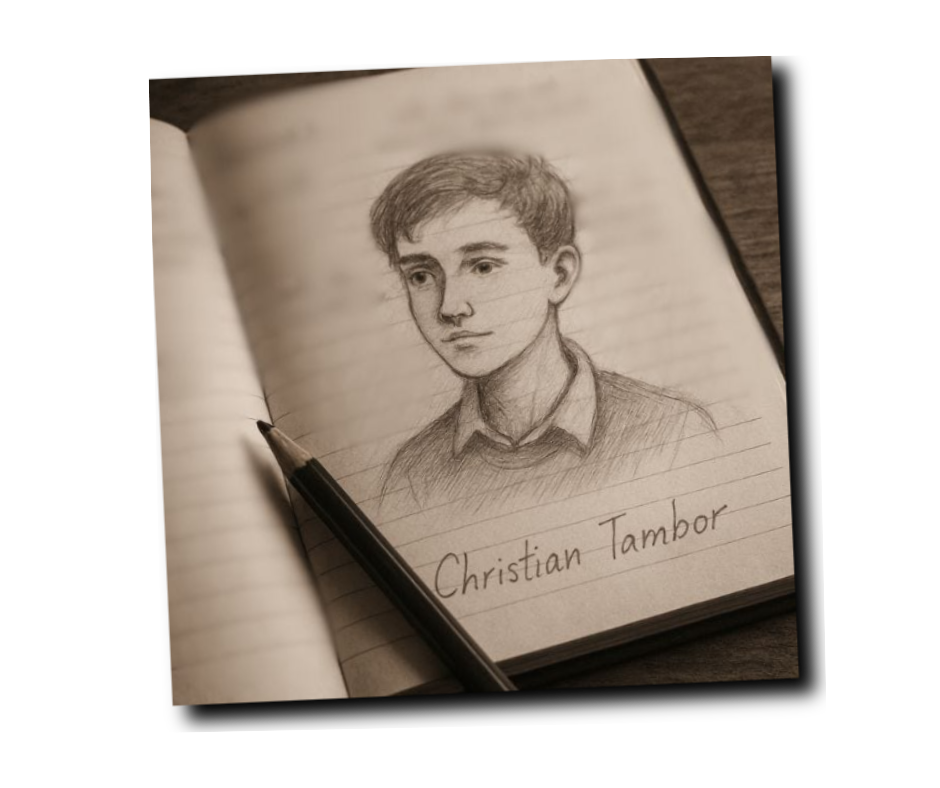Welcome to Ink & Bone
This is not where the old drafts lived. It’s where they were held. Whispered to. Waited for. For decades, I wrote without sharing, not because I wasn’t ready to publish, but because I wasn’t ready to let go. Ink & Bone is a slow unsealing… But it is also something else. It’s a lifting of the curtain. A glimpse behind the stories I carry. How they began. Why they stayed. What they meant before anyone else could read them.
This is where Elias lingered long before His, Theirs, Enough. Where Mira reached for something dark before Let the Dark Take Me had a title. Where Gunther watched. Where Christian breathed through graphite and grief. Where Rowan, Marlo, Plain, and R.J. first sharpened their teeth.
Ink & Bone is not nostalgia. It is not memory for memory’s sake. It is the anatomy of how stories are made. And why some take a lifetime.
I didn’t mean to write him.
Christian Tambor came before I knew what a protagonist was. Before I understood plot, structure, narrative arc... Even before I realised stories didn’t have to be hidden under my bed, prayed over like a sin. I wasn’t trying to make a book. I was trying not to disappear.
I was twelve. Maybe thirteen.
Somewhere between boyhood and bloodletting.
Somewhere between Hail Marys and bruises.
I didn’t write because I wanted to.
I wrote because my body didn’t know how else to speak.
So I made a boy who did.
He didn’t have a name at first. Or rather, he had too many. Jamie. Blake. Daniel.
Safe names. The kind you forget after roll call.
Names that sound like someone who plays rugby, or slips quietly through a maths class.
But he wasn’t that boy.
He was smaller. Always watching.
He folded poems into his socks.
He counted things: footsteps, lies, moments between door creaks.
He looked out windows like someone trying to remember how light worked.
And I loved him.
Fiercely.
Long before I knew that’s what I was doing.
I wrote him in pencil. On the backs of schoolbooks. Between spelling tests.
Saved him in WordPerfect files with names like not_a_story.doc, or homework2_finalFINAL.
Scratched him onto church bulletins during Mass, saints on one side, blank on the back, begging for something filthy or true.
Christian wasn’t planned. He wasn’t crafted. He leaked.
He slipped out in fragments: single lines, stuttering scenes, never with an ending.
He always made it to the middle.
He never made it out.
And I think I knew why.
Because I wasn’t sure I would either.
The early 90s in regional Australia had no place for soft boys.
Certainly not queer ones.
Not the ones who cried during hymns, or flinched when the back door slammed, or held a best friend’s gaze for a beat too long.
Not the ones who felt things they couldn’t name... And feared the naming more than the feeling.
So I handed it to him.
All of it.
Let him carry what I couldn’t.
Let him survive what I hadn’t yet learned how to.
Christian didn’t say much. Not in those early drafts.
But the silence around him... it howled.
Every time I placed him in a scene, whether a library, a lounge room, a backyard with a rotary clothesline spinning in the wind. I felt it: that thick, quiet ache. That hum beneath the words. And after I wrote, I didn’t feel better. Just... Quieter. Like something sacred had been touched.
I didn’t know the terms yet.
Not trauma. Not queerness. Not craft. Not survival.
Only this: it was real. It belonged to me.
And no one could take it if I kept it close.
But I didn’t keep it close.
Not really.
I wrote him again. And again.
Always returning to the blank page, like prayer.
And every time, he was waiting.
Not asking.
Not crying out.
Just... There.
And I didn’t know it then. I couldn’t have.
But I was writing the first boy I would ever love.
He just happened to be made of ink.





